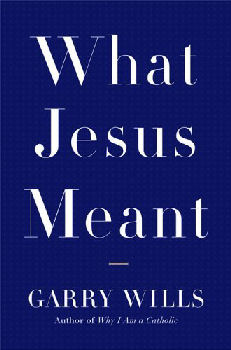
|
Posted April 11, 2006
Book: What Jesus Meant Author: Garry Wills Penguin Group, New York, 2006, pp. 143 An Excerpt from the Jacket:
But Will is just as critical of those who would make Jesus a mere ethical teacher, ignoring or playing down his divinity. Jesus without the Resurrection is simply not the Jesus of the gospels. Wills calls his book a profession of faith in the risen Lord, the Son of the Father, who leads us to the Father. He argues that this does not make people embrace an otherworldliness that ignores the poor or the problems of our time. An Excerpt from the Book: Against Religion The most striking, resented, and dangerous of Jesus’ activities was his opposition to religion as that was understood in his time. This is what led to his death. Religion killed him. He opposed all formalisms in worship — ritual purifications, sacrifice, external prayer and fasting norms, the Sabbath and eating codes, priesthoods, the Temple, and the rules of Sadducees, Pharisees, and Scribes. He called authentic only the religion of the heart, the inner purity and union with the Father that he had achieved and was able to share with his followers: “When you pray, be not like pretenders, who prefer to pray in the synagogues and in public squares, in the sight of others. In truth I tell you, that is all the profit they will have. But you, when you pray, go into your inner chamber and, locking the door, pray there in hiding to your Father, and your Father who sees you in hiding will reward you. And when you pray, do not babble on as the pagans do, who think to win a hearing by the number of their words. Your Father knows what you need before you ask it of him. This inner religion is not less demanding of the worshiper, but more demanding. It calls for a radical cleansing of the heart not to be achieved by externals: “You have heard the commend, Commit no adultery. I, however, tell you this: One looking at a woman with desire for her has already committed an adultery of the heart. If your right eye makes you fall, rip it out and cast it away. It is better to lose one part of your body than for all of it to be cast into hell. If your right hand makes you fall, chop it off and cast it away. It is better for you to lose one part of your body than for all of it to be cast into hell.” As with his other teachings, his followers could not understand Jesus on this matter of inner purity. Even as he neared death, when he tried to set the pattern of menial service as the mark of his life, Peter was obtuse. When Jesus did observe the ablution before meals, Peter said that Jesus could not stoop so low as to wash his followers’ feet. In his typically peremptory tone, Peter informed Jesus: “Never will you wash my feet.” But when Jesus insisted, Peter flipped to the other extreme: “Then not my feet alone, but my hands and head as well.” Jesus says he is missing the point — that the intention, the inner state of service being signaled is what matters, not the external ritual: . . . As Jesus went to the inner truth of the purity code, so he went to the inner truth of the Sabbath, where he rejected niggling legalities. Table of Contents: 1. The hidden years 2. The work begins 3. The radical Jesus 4. Against religion 5. Heaven’s reign 6. Descent into Hell 7. The death of God 8. The life of God |
|
